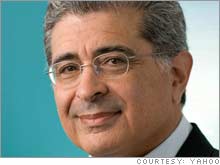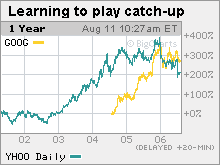|
Yahoo vs. Google, round two The company took a beating last month, but CEO Terry Semel tells Fortune's Adam Lashinsky that he likes its chances against Google, YouTube, and MySpace.
(Fortune Magazine) -- The year since Yahoo topped Fortune's list of the 100 Fastest-Growing companies has been a rough one for CEO Terry Semel. Investors pummeled Yahoo's stock - it fell 22% in a day - when he announced in July that the company would delay by three months the introduction of its new search-advertising system, code-named Panama. The new technology is supposed to narrow the gap with Google (Charts), which delivers its advertisers far more revenue per click in search results, and Wall Street has begun to have doubts about Yahoo. (Charts) Semel, who brought Yahoo back from the brink after joining the company in 2001, is taking the setbacks in stride.
On a hazy day in early August at Yahoo's offices in Santa Monica, he expounded on why Yahoo's wider array of offerings will help it to prevail over its rivals - and why he prefers his Gulfstream jet to the Boeing 767 Google co-founders Larry Page and Sergey Brin have bought. A year ago Fortune said you had a "bold master plan to transform Yahoo into the 21st century's first media titan." Is the plan intact? Yes. Initially the basic strategy was "How broad can we build the audience by providing better products and services?" We moved about a year ago to spending much more time focusing on depth, on deeper user experience. As a result, in the past four quarters Yahoo was the only major Internet company that experienced people spending significantly more time on its site doing more things. What's an example of depth? Yahoo Music. Basically, Yahoo Music has the same content as our competitors. But we let people exchange playlists through instant messaging and generally have a more personalized experience, and that contributes to our having the largest audience. Isn't Apple's iTunes far bigger than Yahoo Music by revenue? From a profitability standpoint, though, we're bigger. The margin on selling songs for 99 cents - [Semel makes the symbol for zero]. However, Apple (Charts) sells devices, which is a terrific business. We're not in that business. We sell ads. Having a dedicated audience that spends a lot of time doing whatever they do leads to very good advertising prospects. MySpace and YouTube have also built huge audiences in areas where Yahoo should have had a leg up. How did that happen? They've grown quickly. But Yahoo has very large audiences in the youth demographic too. For example, in what we call social search, our new product Yahoo Answers already has north of 50 million users. We spent the first half of this year building video infrastructure throughout our network - in sports and in news, for example. You can count on Yahoo taking video to the next step. Most companies would kill for 29% revenue growth, which is what Yahoo is forecasting this year. But that's down from 42% last year and 77% in 2004. How do you combat slowing growth? Search is clearly one of the two most viable advertising marketplaces. Getting Panama right will increase profitability on everything we do. How could you say in May the search-advertising platform was ready, only to delay it two months later? In May we began to test the platform and show it to advertisers. We decided we wanted more time to do additional tests, and advertisers told us they wanted more time to adapt their systems. We decided to do it properly rather than rush. With the recent deal between Yahoo and eBay (Charts), the two companies have gotten very chummy. Why not go all the way and merge? I think what we're doing right now is going to benefit both companies an awful lot. I see that you have become a dollar-a-year man in salary. Are you feeling the pinch? I feel great about it. In fact it's what I asked for when I joined the company. I think I should be rewarded based on the company's success. Google's motto is "Don't be evil." What's Yahoo's? [Long pause.] I don't know that we have a motto. Well, the mission of the company is, Deliver great value to our consumers and, basically, value them. Are you impressed that Rupert Murdoch's an Internet mogul now? There's nothing he can't do. He's a visionary and a guy who takes risks. Who wins when the two of you play tennis? We play doubles, and it depends who has the pro. When the Google founders take delivery of their 767, are you going to have to up the ante and get a bigger jet? For one thing, Yahoo doesn't have a plane, I do. In no way is it Yahoo's responsibility. What will be curious [for the Google guys] is the upkeep. They're not that expensive to buy, relatively speaking, but [767s] eat fuel. Everything about them is more expensive, like landing fees. From an investor's standpoint, what makes Yahoo a better bet than Google or other rivals? We're not comparing ourselves to any one company, but as we look ahead in a connected world, just being really good at one thing may not be enough. I'm glad that Yahoo has become really good at a number of things. We had a very significant financial growth story. As we improve our revenues per search and we financially maximize many of the things we've been doing, like Answers and Flickr, we won't be totally dependent on any one thing or any one market. Things change very quickly, and I think we're the company best positioned for change. Long term, I think Yahoo is the best-positioned company on the Internet. |
|


